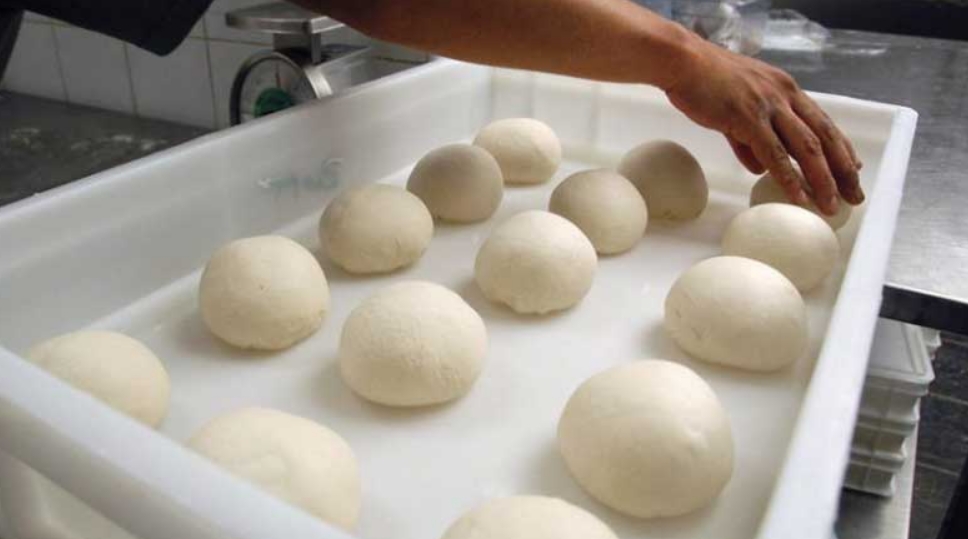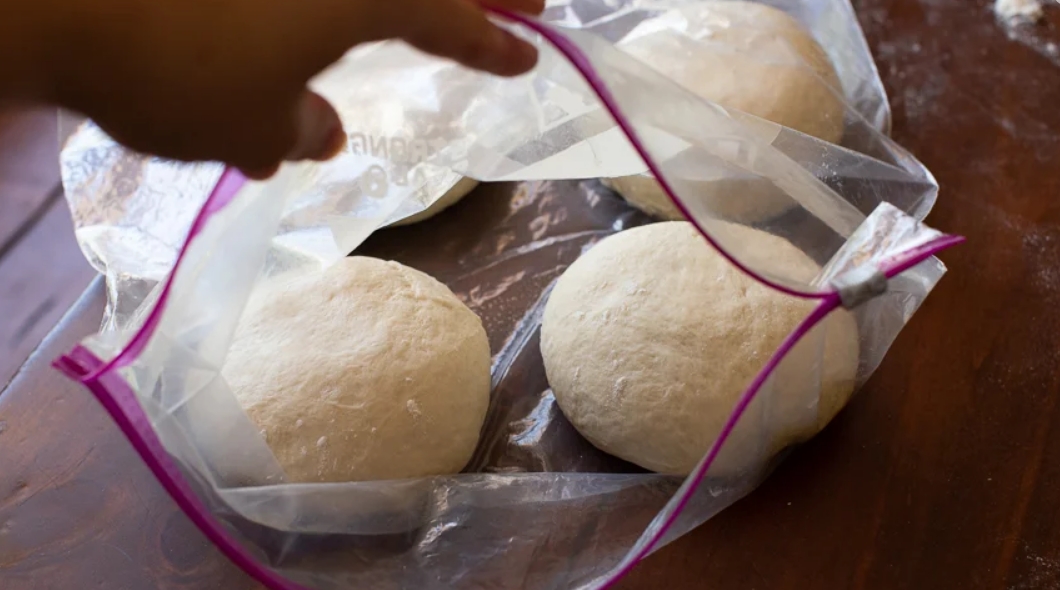Key Takeaways
- Keep pizza dough in a sealed container or wrap it well in plastic to prevent drying.
- Rub a bit of olive oil on the dough to prevent a hard crust from forming.
- Make sure there’s enough space in the container for the dough to grow as the yeast works.
- You can keep homemade dough in the fridge for 3 to 5 days, and dough from the store for up to two weeks.
- Before you use it, check the dough for any bad smells or mold.
Storing pizza dough correctly is crucial for keeping it good and usable, whether you refrigerate or freeze it. The proper storage methods make a big difference.
For the fridge, wrap the dough in plastic or put it in a sealed container to prevent drying out. Rub a little olive oil on the dough to keep it moist and prevent a crust from forming.
These steps are key to maintaining the dough’s texture and stretchiness. They also help improve the flavor as it slowly ferments, making your pizza even better.

How Long Can Pizza Dough Last in the Fridge?
Homemade dough (3-5 days)
Homemade pizza dough stays suitable for 3 to 5 days in the fridge. Use simple ingredients like flour, water, yeast, salt, and olive oil.
Keeping it cold slows down the yeast, improving the crust’s taste and texture. Store the dough in a tightly sealed container or wrap it in plastic to keep it from drying out.
A light coat of olive oil also helps keep it moist and stops a crust from forming on the surface while it chills.
Store-bought dough (longer shelf life)
Store-bought pizza dough usually lasts up to two weeks in the fridge because it has preservatives that keep it fresh and stop harmful microbes from growing.
To store it right, keep it in its original package if it’s airtight, or put it in an airtight container. This keeps the dough from picking up fridge smells and moisture, which could ruin its flavor and texture.
If you’ve opened the package, wrap the dough tightly in plastic wrap before putting it in the container. Always look for signs of spoilage like a sour smell or mold before using it.
The Best Way to Store Pizza Dough in the Fridge
Wrap dough tightly in plastic wrap

Wrap pizza dough tightly in plastic wrap to keep it moist and prevent it from drying in the fridge. This method helps keep the air out, avoiding a hard and unwanted texture. Ensure the plastic wrap touches all parts of the dough to prevent air pockets.
This tight wrapping keeps the dough wet and ensures it holds its shape and taste. Using good quality plastic wrap helps keep the dough fresh and ready for baking.
Allow room for expansion
Wrap pizza dough loosely to prevent drying out, but make sure there’s enough room in the container for it to grow. The yeast in the dough raises it, even in the fridge.
If it’s packed too tightly, it might lose its shape or pop the container open, ruining the dough. Use a container that’s a bit bigger than your dough ball. This helps the dough stay in good shape and makes sure it bakes into a nice crust.
Refrigerate for 1-3 days
Refrigerating pizza dough for 1-3 days improves its flavor and texture. This slow fermentation process lets the yeast break down carbs into simpler sugars, enhancing the taste. The yeast also improves the dough’s texture by forming small, even air bubbles.
Store the dough in a sealed container or wrapped well in plastic to keep it from drying out and to keep moisture in. This method makes better pizza dough and lets you prepare it ahead of time.
What to Do Before Using Pizza Dough Stored in the Fridge
Remove from fridge and let it come to room temperature
For best baking, take the pizza dough out of the fridge and let it warm to room temperature before you shape it. This makes the dough easier to work with. Cold dough is stiff to stretch and might snap back.
Letting it sit out for about one to two hours, depending on how warm your room is, helps the dough relax and the yeast wake up again. This is important for the dough to rise well and for your pizza crust to taste great.
Punch down and shape into desired size
After the pizza dough warms up to room temperature, punch it down gently and shape it to fit your recipe. This step is critical because it evens out the yeast activity in the dough, ensuring a consistent texture and taste.

Punching down the dough also gets rid of extra gas, which keeps it easy to handle and stops it from over-proofing. Flatten the dough carefully, then slowly shape it for your pizza. This helps create a uniform crust that will bake well, making for a great pizza.
Allow to rest before stretching
Let your pizza dough sit out before stretching it. Fresh from the fridge, dough is too cold and stiff, making it hard to shape. Letting it warm up softens it and makes it easier to handle.
This rest lets the tight gluten loosen, helping you stretch the dough without tearing it. Leave it out for at least 30 minutes, or until it’s soft and slightly elastic. This makes sure your dough is ready for a great pizza.
Conclusion
Storing pizza dough correctly is critical to keeping it fresh and improving its taste and texture. Use the fridge for cold fermentation, which keeps the dough good longer and makes it taste better.
You can wrap the dough in plastic or put it in a sealed container to keep it moist and let it develop well. Always coat the dough with a bit of olive oil and check it for any spoilage before using it.
Following these storage tips will help ensure your pizza base is ready to make a great meal.
Frequently Asked Questions
Can I Store Gluten-Free Pizza Dough in the Fridge?
Yes, you can keep gluten-free pizza dough in the fridge. Just make sure it’s in an airtight container or wrapped tightly in plastic. It will stay good for up to 5 days, and this resting can even improve its taste and texture.
What Happens if Pizza Dough Freezes Accidentally in the Fridge?
If your pizza dough freezes in the fridge, it should still work. Thaw it in the fridge first, then warm it to room temperature before you shape and bake it.
Is It Safe to Store Pizza Dough Near Raw Meat?
Don’t store pizza dough near raw meat. It might cause contamination and make people sick. Keep them separate in the fridge.
How Can I Tell if Refrigerated Dough Is Over-Fermented?
To check if your refrigerated pizza dough has over-fermented, notice if it smells sour or has turned a greyish color. Also, if the dough feels too sticky or slimy, it’s probably not good anymore.
Can I Use Pizza Dough Straight From the Fridge for Grilling?
To grill pizza dough straight from the fridge, let it warm up to room temperature first. This helps it stretch evenly and stops it from ripping when you grill it.

Deepak Sharma is a passionate writer and avid traveler who specializes in uncovering the beauty and history of India’s attractions and temples. A graduate of Delhi University, Deepak has a deep-rooted love for his country and its rich cultural heritage.
